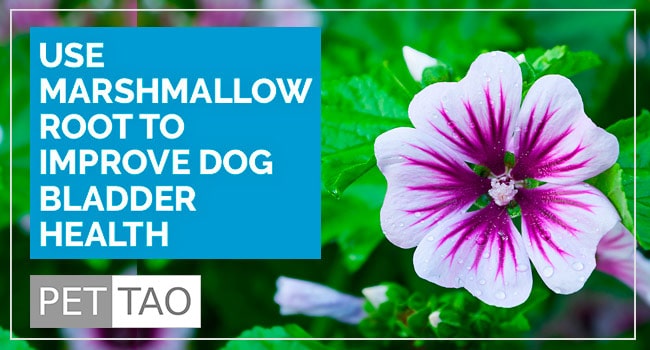Marshmallow Root Helps Dog Bladder Challenges
Marshmallow root is an amazing natural tool for helping dog bladder challenges.
How do you know if your dog has bladder issues?
Look for these signs:
- Accidents in the house
- Urine is dark and cloudy or shows blood
- Straining to urinate or unable to pass urine
- Drinking more water than usual
- Licking his or her urinary openings
- Lethargic, vomiting or won’t eat
Take your dog to the vet if he or she experiences these symptoms.
A urinary tract infection might cause these symptoms, or something more serious such as:
- Kidney failure
- Cushing’s disease
- Diabetes
- Bladder tumor
- Bladder or kidney stones
- Non-infectious bladder inflammation (sterile cystitis)
- A “foreign body”
Additionally, dogs with Cushing’s disease repeatedly treated with steroids or catheterized dogs have an increased risk for E. coli-related bacterial UTIs.
A holistic vet who practices Traditional Chinese Veterinary Medicine (TCVM) may recommend a supplement containing marshmallow root in addition to traditional treatment.
What Is Marshmallow Root?
The Greek name for marshmallow root is Althea, which means “to heal.”
Don’t confuse marshmallow root with the marshmallows we see in the grocery store!
They no longer contain the plant. The Greek physician Hippocrates used marshmallow root to heal wounds.
In the Middle Ages, physicians administered the sap of the plant in a tea to soothe colds and sore throats.
Marshmallow is also used to treat asthma and blood sugar management for diabetics.
The plant can be applied topically for:
- Abscesses
- Insect bites
- Burns
- Chapped lips
- Skin ulcers
- Detangling hair
Why Is Marshmallow Beneficial for Soothing Dog Bladders?
Marshmallow root is an antimicrobial, demulcent, emollient, hypoglycemic and immunostimulant.
Demulcents form a soothing film over a mucous membrane.
According to one study, the demulcent property of marshmallow root soothes membranes.
Mature marshmallow roots contain as much as 35% mucilage, a gelatinous solution from plant roots, making it useful for treating internal mucous membranes.
The mucilage provides a protective barrier between membranes, such as the lining of the bladder, and irritants.
Marshmallow also acts as a diuretic, increasing the flow of urine.
The plant helps minimize discomfort associated with kidney stones.
Marshmallow is beneficial when combined with other diuretic herbs for kidney treatments or urinary problems.
Does Marshmallow Root Have Side Effects?
Marshmallow root can lower blood sugar levels. Use with caution in diabetic animals.
Marshmallow may also slow the intestinal absorption of some drugs.
Science has not proven whether or not marshmallow is safe for pregnant or nursing animals.
Use only as directed by your veterinarian. Responses to supplements may vary by animal.
How to Use Marshmallow with Other Herbs and Compounds
Marshmallow’s benefits are best when combined with other compounds.
For example, a supplement including Cranberry juice extract, Juniper Berry, Marshmallow Root, and Uva Ursi would most effectively help your pup.
Seeking an all natural supplement to help your dog’s bladder challenges?
Other Powerful Tools to Help Your Dog’s Urinary Tract & Bladder Challenges
There are many quick and easy changes you can make at home to help you give your dog an edge on easing urinary tract challenges.
- Learn more about dog urinary tract challenges.
- Provide bladder support. PET | TAO’s Soothe Bladder is a blend of Eastern herbs and Western supplements working together to soothe your dog’s bladder and urinary tract.
- Consider a Cooling Diet. PET | TAO’s Chill cools inflammation caused by infection. Make sure to discuss any dietary changes with your holistic vet.
- Try PET | TAO Freeze Dried Beef Kidney Treats. According to TCVM, kidney controls kidney, bladder, and urinary tract functions.. As few as 5-6 treats per day can make a huge difference in your urinary tract and bladder health!
- Learn more about TCVM Herbal Remedies. Chinese medicine offers many amazing natural solutions for canine bladder and urinary health challenges. Some good examples are:
Get A Phone Consultation with One of Our TCVM Veterinarians








